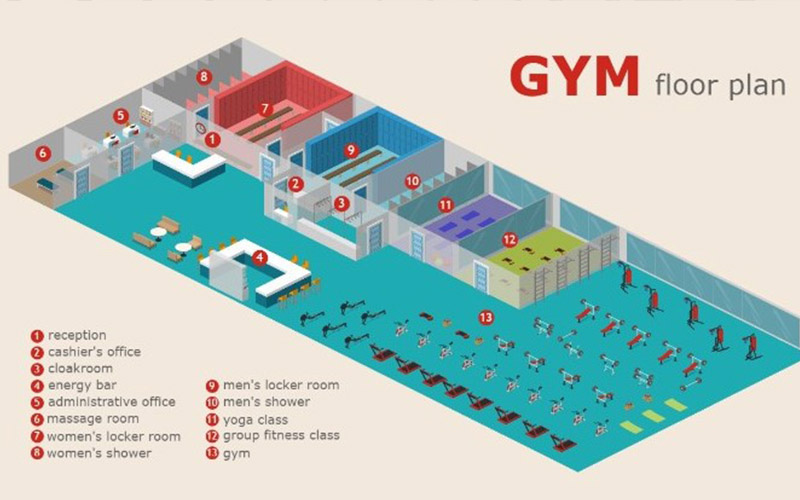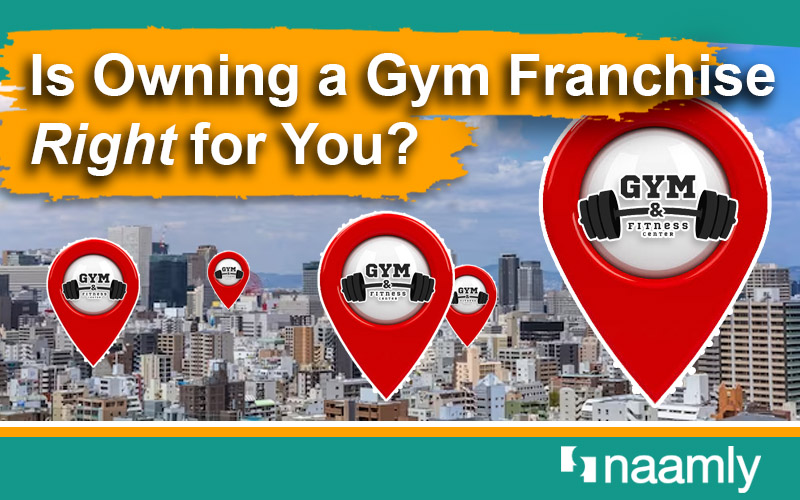Do you find yourself driving by gym franchises and daydreaming about owning a gym franchise?
Does it seem like a simple investment, and you think about how nice it would be to have automatic success based on recognition of a proven brand?
Or do you think it would be too restrictive for your ambitions, requiring too much money up front and delivering not enough freedom later?

Well, like many things in life, there’s no easy, “one size fits all” answer to the question of whether owning a gym franchise is right for you.
But if you’re thinking about it, you’re not alone. Countless fitness entrepreneurs consider the possibility every year.
It’s a common question that comes with plenty of pros and cons on both sides, which might make it fairly easy to reach the decision that’s right for you.
So, now that you’ve decided to open a gym or studio, let’s get into it the nitty gritty of owning a gym franchise.
Pros & Cons
Here are some of the common pros and cons of owning a gym franchise.
PROS
1. Brand Recognition. Some franchises have thousands of locations, national advertising budgets, and high awareness in the culture. Buying into that brand gives you that instant identification with something people already think they know.
2. Proven Success. Franchises provide everything you need to get going; they’re often called a “business in a box” for that reason. You pay the fees, and you get what’s necessary, from marketing to systems to preferred vendors and maybe some discounts.

3. Helpful Support. Some franchises provide a lot of hands-on support to their franchisees, as well, so you don’t feel like you’re out there on your own every day. You also get an instant community of other franchisees of the brand.
CONS
1. Up-front Costs. Depending on the brand, you could be expected to put up hundreds of thousands of dollars in fees, royalties, and other startup costs – plus share some ongoing royalties that you’ll have to pay.
2. Are You Worth Enough? You might even have to have a minimum net worth, with a minimum amount of liquid assets, or cash on hand. By comparison, opening your own gym is less cash-intensive to start.
3. Less Flexibility. The brand will enforce many expectations in things like hours, gym size, membership fees, marketing, and more. That’s what having a brand means, after all.
In addition, some entrepreneurs might have the misconception that owning a gym franchise is a license to manufacture passive income.
But that’s just not true. It’s a lot of hard work.
The success of your business – on your own or in a franchise – will rely on you most of all.
And remember this. If you decide to franchise, do your homework and choose carefully. Not all franchises are created equally, and they all have different terms, including revenue sharing, that will affect your decision.
Further Benefits
Some companies also offer more granular assistance.
For example, Xponential Fitness owns a range of brands, including Pure Barre, Row House, and Club Pilates. The parent company says it “has the resources, platform, and network to ensure continued growth and support for our franchise partners.” It helps with:
· Real estate – finding the right location and executing the best lease
· Construction and Design
· Hiring Assistance
And if you’re really ambitious about having multiple locations, then franchising can lead to more opportunities to do that than struggling with your own brand, many find.

“I’m interested in scale opportunities,” says Mark Fisher, who has owned his own successful studio in New York City for years and recently bought an Alloy Personal Training studio, as well.
“It seemed going in on franchise … would facilitate and speed up that process,” Mark says. “I am essentially paying for speed. I don’t want to find the vendors (for example). Just tell me which vendors to use.”
Mark says he has no ego about “running somebody else’s playbook,” but that can be a concern for some gym owners who have had success on their own.
When you buy into a franchise, you have to give up a lot of control.
“We’re giving you best practices on what works,” says Alloy CEO Rick Mayo on his podcast. “It’s always a bit of a reeducation.”
Franchise consultant Kim Daly tells Rick, “Starting a business on your own is jumping into the deep end of the pool with no ability to swim and trying to survive. Becoming a franchisee is like going to swimming lessons, learning how to swim, and then swimming yourself out to the deep end with a lifeguard beside you.”
You get support and knowledge, “But you still have to swim.”
Choose Your Niche
The proliferation of fitness franchises means you can have your choice of niche in owning a gym franchise. Alloy, for instance, focuses on people 45 and over.
And, at the opposite end of the spectrum, the Parisi Speed School system is aimed at “empowering America’s youth through increased fitness, confidence and performance.”
It has more than 100 locations that use “a curriculum based in science and sports psychology to help every athlete reach their potential.”
That targeted focus drew Sheldon Howell to open the location in his native Wichita, Kansas.
“Kids were my passion, and coaching, and being involved in sports,” he says. “So, this was a very good platform to be able to accomplish all of those things. Everything we promote is what I believe the youth sports world needs.”
When looking into various companies, also consider points such as:
· Initial investment and fees
· Ongoing commitments, like royalties, advertising and remodeling costs
· Average revenue generated and average profits
· How long it will take to regain your investment
Many smart fitness entrepreneurs look into owning a gym franchise and deciding against it. There’s no universal “right/wrong” here.
“I had a different vision in my mind, and it wasn’t going to work for what I wanted to do – their concept and programming,” says Rosa Coletto of Full Circle Fitness in Orange County, California. “There were options I could’ve bought into, but it was not what I wanted to do.”
Still, she saw some attractive elements to owning a gym franchise, chiefly in helping a new owner overcome “the massive learning curve.”
Do your research, talk to others who have followed each path you’re considering, and make the choice that aligns with your values, ambitions, and desires.
Regardless of which way you go, fitness entrepreneurship is a) a ton of hard work and b) a richly rewarding way to help other people through your work.

This is an exciting time to be in the fitness industry. And you can accelerate your success faster and further this year with Naamly’s free Fitness Business Boost Bundle. It includes ways to get new clients without running ads; where to hire the best trainers, and how to raise your retention rates. Get it here.

